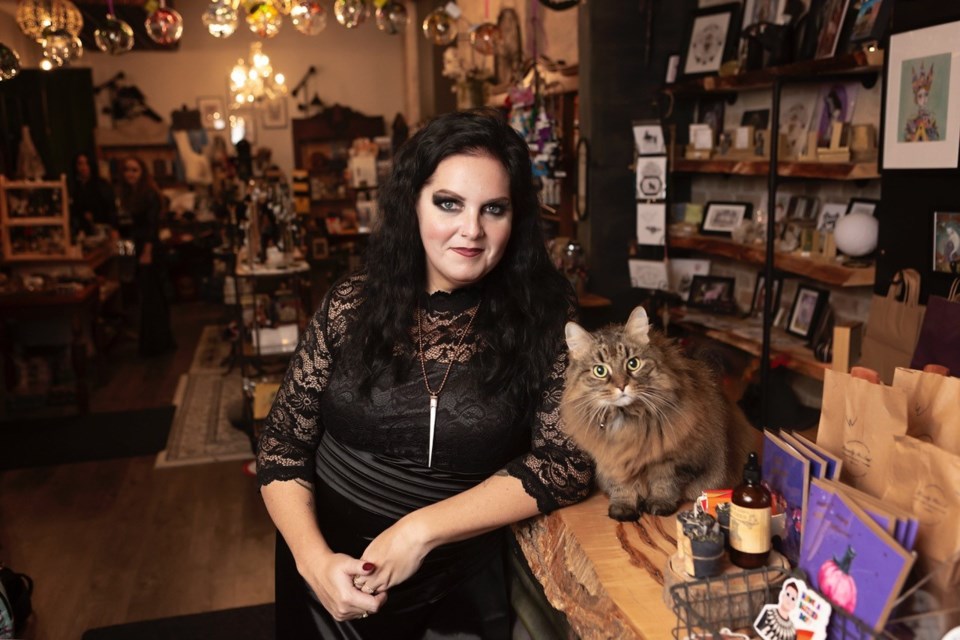All you need are a few simple ingredients, and achieving your dreams could be just an incantation away. But in today's economy, even magic comes at a price.
Social media platforms such as TikTok are conjuring a boom in demand for magical wares, services and education, Canadian witches say, particularly as Halloween thins the veil between the worlds of the living and the dead.
As online communities such as "WitchTok" have given the magically inclined a place to congregate, so-called "spiritual entrepreneurs" are tapping into the trend to sell occult paraphernalia ranging from spell kits to altar accessories, says Chris Miller, a post-doctoral fellow at University of Ottawa who researches new religious movements and non-religion.
In a 2022 paper in the Religions journal, Miller analyzed more than 1,500 witchcraft-related TikTok videos to examine how witches "enchant" consumerism. He found there was a thriving online market for spell jars, magical liquids and witch kits, and many of these products were principally composed of common herbs, candles and other easy-to-find ingredients.
Still, Miller says he sees why some people might find added value in supporting witch-owned businesses rather than ordering the same items from a conglomerate like Amazon.
"You're going to have companies that ... are very grassroots and are presenting themselves as authentic," Miller says in an interview. "Then you're going to have people who an insider to the community might say, they're just trying to cash in on this trend."
The rising online popularity of witchcraft has revealed a schism between self-proclaimed true believers and perceived interlopers that are dismissed by some as "esthetic witches," says Miller.
However, he says, the critics and the criticized may very well be buying the same spell books, tarot cards and cauldrons.
"It's like a 'The Bachelor' thing of, are you here for the right reasons?" says Miller. "People who are decrying the kind of 'you're just here for the esthetics of it' are in many ways themselves also replicating that esthetic."
Maddie Cumming, owner of the Lunar Mouse in Calgary, says she doesn't believe tradition and esthetic should be mutually exclusive.
While she identifies as a "spiritual creature," Cumming markets her vintage witch kits packed with ingredients for spells, potions and elixirs to newcomers and experienced witches alike.
"We can love things because they're beautiful, and because they're useful as well," she says. "My practice is that I want to have everyone feel included and be able to learn."
Cumming, who started her e-commerce business during the COVID-19 pandemic, says it makes sense that people might be looking for a little more magic in their lives during these topsy-turvy times.
"TikTok and just the total state of the world has been a plus for the magic community," says Cumming. "I think a lot of people wanted to join in on the fun, because it's fun to be a witch."
Kim Goodhue, owner of Purely Wicked, says her brick-and-mortar witchy boutique in St. Thomas, Ont., welcomes everyone, from practitioners who want to learn more about a particular kind of magic to fans of Harry Potter.
"There's no rules to witchcraft," says Goodhue. "I'm not going to tell you how to choose your spirituality."
Goodhue sees rising interest in witchcraft and other alternative forms of spirituality as part of a broader pushback against the patriarchy and other systems of oppression.
"Witchcraft has always been an out for people on the fringe of society," she says. "People wanted some way of taking control back, and witchcraft is a way to do that."
Kiki Keskinen, founder of WitchSchool Canada, says the esthetics of witchcraft can often be a "door opener" to something deeper, attributing the exponential growth in enrolment in her 11-month educational program in part to TikTok.
Keskinen, who describes herself as a seventh-generation Celtic witch, says she sees the reclamation of witchcraft as a response to climate change and a growing desire to reconnect with nature.
Whether you're putting on a costume or casting spells, she encourages people to be on alert for supernatural occurrences this Halloween.
"We seek out magic in our lives right now because we feel magic inherently."
This report by The Canadian Press was first published Oct. 25, 2022.
Adina Bresge, The Canadian Press



